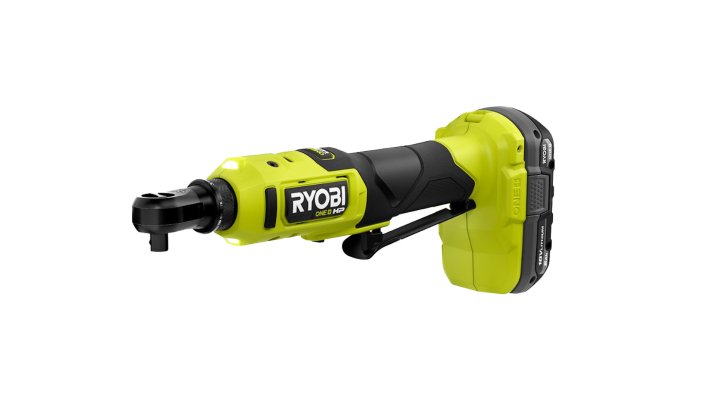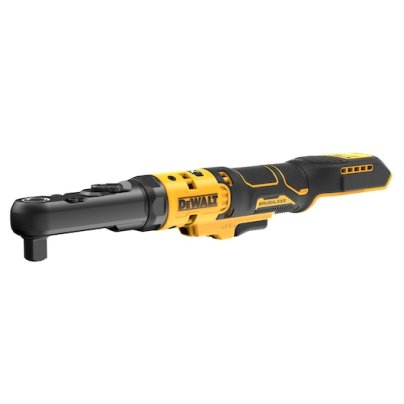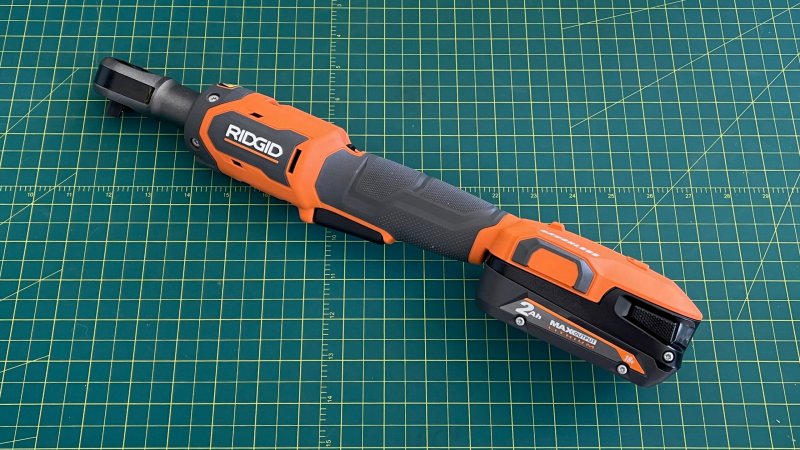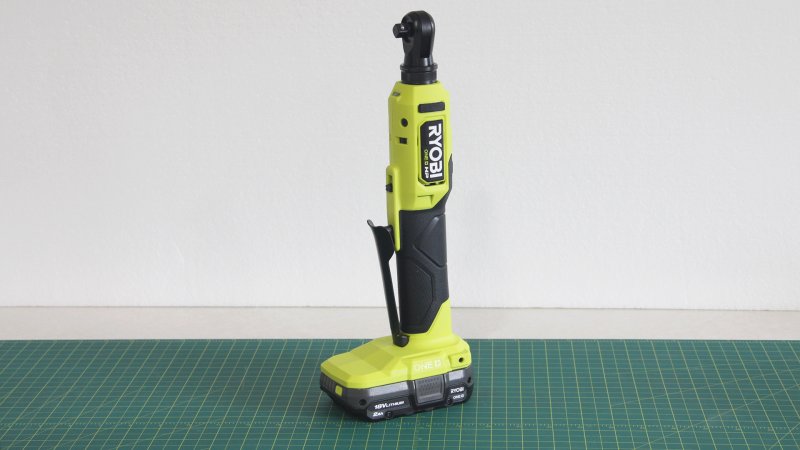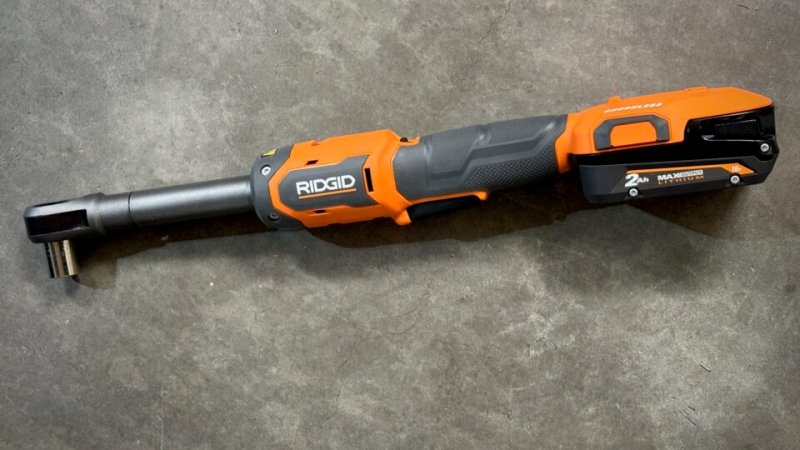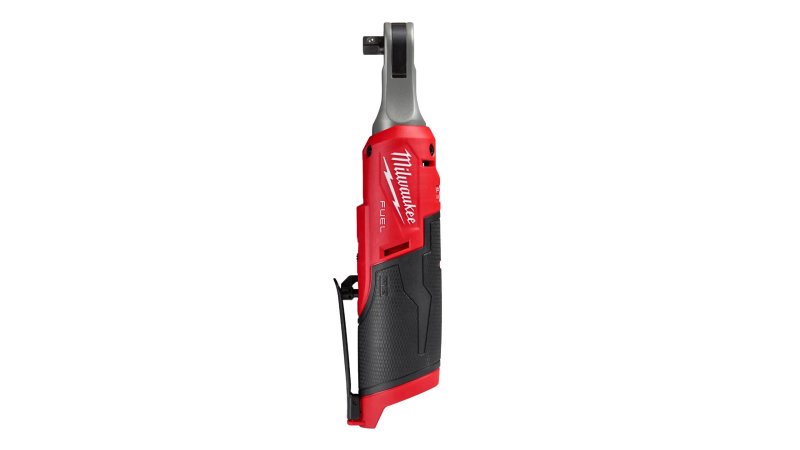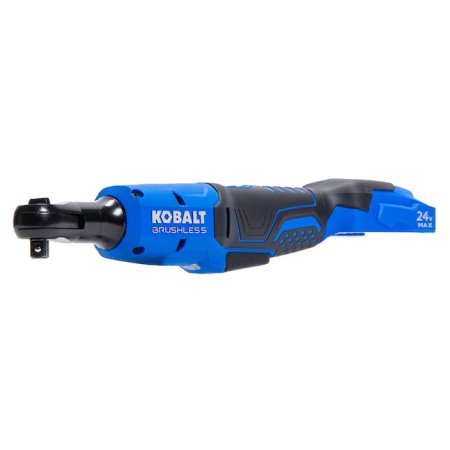We may earn revenue from the products available on this page and participate in affiliate programs. Learn more ›

The origins of the first ratcheting wrench are pretty murky. There are several people who’ve claimed to be the inventor, and a look at history shows there were legal battles over the patent. What we do know is the first patents were filed and granted in the 1860s, but first prototypes were likely built in the late 1850s. That’s right folks, the ratchet predates the car by a quarter century. I have no idea when people started staring at the socket and spinning the ratchet handle, though.
We all know modern cars have become much more complicated since that first manual ratchet appeared. A typical car is now held together by as many as 30,000 fasteners, and somehow all of them seem to be in the way of every 30-cent part that’s only going to take you 10 minutes to replace. To save your wrists, you can use a cordless ratchet to buzz those nuts and bolts off without breaking a sweat.
Yes, I know you already have an impact driver, an impact wrench, and a drill driver. But none of those can get into the spaces a battery-powered ratchet can. Several manufacturers were nice enough to send over units for review and I put them to work, then judged them with harsh vigilance. Here are the best of the bunch.
Summary List
- Best Overall: Ridgid 18V Brushless ⅜ Ratchet
- Best Value: Ryobi ONE+ ⅜ 4-Position Ratchet
- Best Premium: DeWalt XR ⅜ Sealed Head Ratchet
- Best Long Reach: Ridgid 18V Brushless Extended Reach Ratchet
- Honorable Mention: Milwaukee M12 Fuel High-Speed Ratchet
- Honorable Mention: Kobalt Variable Speed ⅜ Ratchet

Our Methodology
To those of you familiar with the tool industry, you may describe this list as predictable. It didn’t seem that straightforward when the sample tools started showing up on my doorstep, and I still don’t think it’s quite as cut and dry as “you get what you pay for.” With value being a main consideration, I first had to determine how people who are shopping for a cordless ratchet are going to use it. Clearly, I’m talking bigger picture than the obvious, removing and installing fasteners.
I have a feeling that a cordless ratchet isn’t going to be someone’s first power tool. These are another time and wrist saver that is going to help supplement a manual ratchet. So, torque is important but not the most important thing. Comfort and ease of use is probably the biggest thing. Obviously, everyone expects a tool to last for years and be able to survive a couple of drops on cement. All of these things were considered, and I considered the entire battery system the tool lives in. Luckily, none of the tools you see here ended up on the, do not buy list, so breathe easy and see what you think works for you.
Best Cordless Ratchets: Reviews & Recommendations
Best Overall: Ridgid 18V Brushless ⅜ Ratchet
Pros
- All around best package available in terms of performance, durability, and price
- Weight and vibration won’t fatigue your hands after long hours under a car
- We’ve always had dependable long term service from Ridgid batteries
Cons
- It’s a big tool, with a big ratchet mech at the top sitting on top of the biggest motor housing in the group
It sometimes takes a bit of work to justify a pick as Best Overall because I have to explain how the most expensive, or least powerful, or whatever can be justified as “Best” because it’s my favorite to use. This Ridgid Ratchet is a cakewalk. Take a look at the specs. It’s well above average in torque at 55 lb-ft, is backed with great service from a brand with proven batteries and despite all this, can be purchased with a 2AH battery pack for substantially less than a DeWalt or Milwaukee without batteries.
It is a big ratchet, the motor housing is substantially larger than any of the other tools tested. But, the grip is a little more slender and easier to hold at weird angles. I do wish the trigger had a little better modulation as it seems to have just a high and low position. The ratcheting mechanism is nice and smooth, it doesn’t feel like trying to hold an angry woodpecker while your knuckles are butted up to a body seam.


I didn’t consider these tools in a vacuum. Buying any cordless tool like this is a commitment to that battery family. Everything I’ve ever used that clips onto an 18-volt Ridgid battery pack has been a great tool. So, I feel comfortable not only recommending this tool to people, but for those of you just getting started either in your own garage or even as a professional, you can build off this tool and battery. One even more last thing, I found that in some cases buying the tool and battery together was less expensive than buying the tool alone – go figure.
Best Value: Ryobi ONE+ ⅜ 4-Position Ratchet
Pros
- Not only does the head rotate, but it’s small enough to sneak into tight spots
- The big trigger is easier to use like a giant shift paddle mounted on the steering column
- The least expensive unit here by a considerable margin
Cons
- The 35 lb-ft of torque is the same as a high-speed Milwaukee 12V
- Perpendicular battery pack is arguably a Pro or Con
At the time of writing this, clicking the link to buy this ratchet will get you the tool, a 2AH battery pack, and a charger for under two hundred bucks. But, I told myself I wouldn’t lean on the low price, as this is a good ratchet whether or not it’s a great price. Let me start by saying I’ve been a European car fan and owner my entire driving life. I understand that there are brands that have haters for no discernable reason, so I get that some of you are turning up your noses just because it’s “the green brand.” Fine, jog on. Go buy your “pro tools” to change your air filter and spark plugs once a year.
The head on this tool has a knurled lock ring that lifts and allows it to rotate in four positions. This is most useful when trying to sneak a socket into places where the perpendicular battery pack might interfere. Let’s talk about that for a second; most brands have a parallel design that works better for some tools. I like this arrangement for ratchets because it allows me to set it down and pick it up without having to reach all the way down to the floor. It really helps when you’re trying to hold something in place while reaching for the tool. It’s a small thing but noticeable.


Ryobi currently has 280 different tools that use its 18V ONE+ batteries. In fairness, I’ve only used a few of them, but they’ve all been good. Managing Editor Jonathon Klein, however, is amassing a decent collection and he doesn’t hold back from using them on everything from house remodeling to working on cars, motorcycles, and UTVs. He beats the ever-living hell out of them.
These aren’t usually the most powerful tools available, but for 90% of users, it will do everything you need.
Best Premium: DeWalt XR ⅜ Sealed Head Ratchet
Pros
- There were a lot of hours put into figuring out how to pack this much torque into such a compact body
- The sealed ratcheting mechanism is a feature I had never even thought that I needed, until using it
- It runs nice and smooth
Cons
- OK, it’s a very good tool but it’s the most expensive by a big margin
I’ll start out with some full disclosure, I own a number of DeWalt tools that I bought with my own money. Yes, I have a tendency to rail against tool snobs who criticize less expensive brands, that they likely have never even owned, and here I am with a cabinet of the yellow brand. They are very good tools, and this ratchet is no exception.
Is this the best ratchet here? It is the strongest, it has the best design, and it works very well. Is it more than the average person needs? Absolutely. Would I recommend this to someone just starting out, it would depend on their financial position. The tool alone, no battery, is 45% more expensive than the Ryobi (with a battery and charger), it’s about 40% more expensive than the Ridgid (with a battery). So just keep that in mind.


The body of the tool is slimmer than the tools making it easier to maneuver around under the hood or around and behind brakes and suspension working in a wheel well. The trigger has more variability than the Ridgid, although still not as useful as the giant paddle on the Ryobi. The real trick is the sealed head, which will likely never need any maintenance. The pawl action is the smoothest here and buzzes more than clicks. If you are really trying to justify the price to yourself, it has swappable anvils so it will work with ½-inch drive sockets as well. DeWalt states it has over 300 tools in the 20V Max family and even has a new pouch cell Power Stack battery that claims to be the most efficient in the industry.
Best Long Reach: Ridgid 18V Brushless Extended Reach Ratchet
Pros
- 55 lb-ft of torque is more than enough in most situations
- Lifetime warranty
Cons
- It seems obvious but the extra length is not ideal when under a car on jackstands
One of the big reasons to like a cordless ratchet over an impact driver is the ability to reach into tight spaces. Sometimes you need even more reach than the normal tool will give, and that’s why things like this Ridgid extended ratchet exist. If you look at our best overall choice, this is the same thing, just with an extension between the body and the head. If you regularly work under a car on jackstands, negotiating this longer ratchet around between the car and the floor of the garage may be somewhat of an issue. But, on the other hand, when you’re trying to get the bolt on the bottom of the AC compressor from the top side, this thing could be a life saver. Like every other tool, there’s going to be tradeoffs.
Honorable Mention: Milwaukee M12 Fuel High-Speed Ratchet
Pros
- Max 450 RPM which is 50% higher than the DeWalt
- Compact dimensions making it similar in size to an air-tool
- Light weight, the only tool here under 2 pounds
Cons
- It certainly isn’t cheap
- It trades torque for RPM coming in at just 35 lb-ft
Milwaukee’s M12 Fuel line of power tools is known for punching above their voltage. Of all the tools here, this will feel the closest to a pneumatic ratchet in terms of size and weight. If you’re concerned about getting into to tight spaces, this is your choice.
Like the DeWalt above, you will pay some pro-tool tax to own one of these. The bare 12-volt tool alone is more than the Ridgid tool and battery. I should point out that it’s also squeezing a lot of performance from just 12 volts, although it is doing just 35 lb-ft of torque.
Again, if we are to look at the family of tools, you’re looking at a catalog of 150+ products. This comes with a 5-year warranty and Milwaukee’s reputation for quality and longevity is well known.
Honorable Mention: Kobalt Variable Speed ⅜ Ratchet
Pros
- Closest in price to the Ryobi
- 24 volt battery delivers 45 lb-ft of torque
- Extremely similar in design to the ridgid
Cons
- Tool issues can be handled in-store, which means customer service can vary widely by locatoin
I didn’t test this tool during the assembly of the guide, it may be possible in the future and you will see an update. The specs on this Kobalt Ratchet look promising. Kobalt claims up to 45 lb-ft of torque and up to 400 RPM performance. That puts it in competition with the Ryobi. It’s worth noting, the tool only is the same price as the Ryobi and battery combo.
Kobalt is making a name for itself in the power tool space. It’s the house brand of Lowe’s, which is pretty common knowledge at this point. The last few years have seen Kobalt refreshing some tool designs and the 24-volt battery packs are some of the most powerful hand tool batteries in the business. Online seem to agree that newer designs all function well, and are worth checking out.
Our Verdict
The choice for best overall cordless ratchet was a tough one, but in the end, the Ridgid 18V Brushless ⅜ Ratchet won out, delivering well above average performance at a well below average price. Our Best Value was a no-brainer. The Ryobi ONE+ ⅜ 4-Position Ratchet more than fulfills the needs of 99% of home mechanics but at a price that nothing else on the list matches.
FAQs
You’ve got questions. The Drive has answers.
Yes, these get in tight spots you could never hope to get an impact into, while basically eliminating the chance of shearing the head off a bolt.
Since it has a ratcheting head like a normal ratchet, you can use the strength in your arm and the leverage provided by the tool to break it loose, then spin it out using the motor.
It sure is, especially when you don’t own or aren’t near a source of compressed air.
The most versatile is ⅜-inch. There isn’t a considerable size difference in ratchets by switching to ¼-inch and a cordless ratchet won’t generate enough torque to justify ½-inch.

